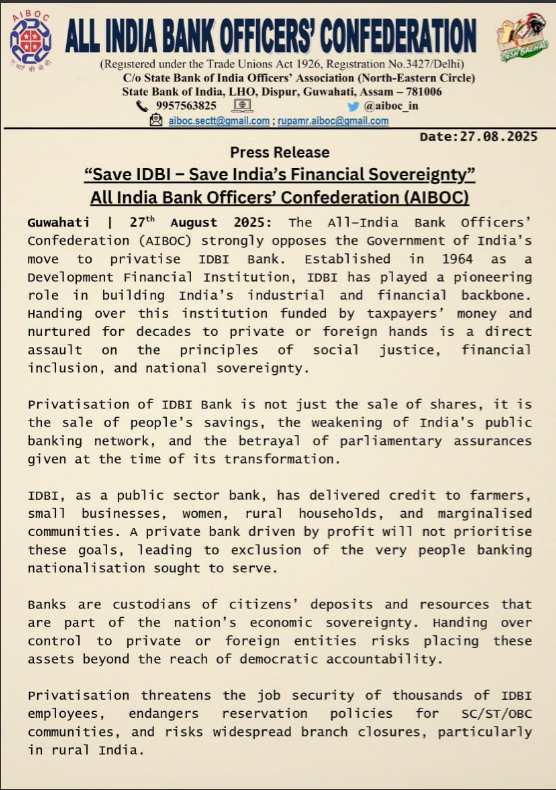AIBOC Opposes IDBI Bank Privatisation; Calls it a Threat to India’s Financial Sovereignty
The All India Bank Officers’ Confederation (AIBOC) strongly opposed the Government of India’s proposal to privatise IDBI Bank, warning that the move would undermine India’s financial sovereignty, social justice, and long-term economic stability.

Author: Ishna
Published: August 29, 2025
The All India Bank Officers’ Confederation (AIBOC) in a statement on August 27, strongly opposed the ongoing developments to privatise IDBI Bank. The news reports say that the bank’s stake is getting handed over to Emirates NDB, a Dubai based entity and the privatisation process is in the final stage.
IDBI’s Legacy
Established in 1964 as a Development Financial Institution, IDBI Bank has been pivotal in India’s industrial and financial growth. According to AIBOC, transferring control of such a taxpayer-funded institution to private or foreign entities would betray national interests.
Concerns Over Public Interest
AIBOC emphasised that privatisation is not just about government disinvestment but also about:
Advertisement
- Compromising public savings.
- Weakening India’s public banking network.
- Betraying parliamentary assurances that safeguarded majority government ownership.
As a public sector bank, IDBI has traditionally supported farmers, MSMEs, women, rural households, and marginalised communities—segments that may not remain a priority under private ownership.
“Banks are custodians of citizens’ deposits and resources that form the backbone of economic sovereignty. Allowing private or foreign dominance risks placing these assets beyond democratic accountability” AIBOC said.
Image - AIBOC statement on IDBI privatisation
Job Security and Social Justice at Risk
The union highlighted concerns over:
- Job security of thousands of IDBI employees.
- Dilution of reservation policies for SC/ST/OBC communities.
- Possible rural branch closures that would restrict financial inclusion.
Legal and Historical Grounds
AIBOC noted that neither the IDBI Act (1964) nor the IDBI Repeal Act (2003) envisaged complete privatisation. Past finance ministers had assured Parliament that government holding would not fall below 51%.
The Confederation also recalled the 1969 nationalisation of banks, which positioned banking as a “sacred trust of the people,” aligned with India’s freedom struggle ideals of swaraj and self-reliance.
Advertisement
Lessons from Banking Crises
Citing failures of private banks globally and domestically—Global Trust Bank (2004), Yes Bank (2020), Silicon Valley Bank (2023), Credit Suisse (2023)—AIBOC warned that private ownership does not guarantee safety or stability.
Call for Withdrawal of Proposal
Instead of privatisation, AIBOC urged the government to:
- Strengthen governance.
- Infuse fresh capital.
- Modernise IDBI digitally.
- Expand its developmental mandate.
AIBOC’s Conclusion
“Privatisation is not reform; it is retreat. Retain IDBI in the public sector to safeguard India’s economic sovereignty, democratic accountability, and the welfare of future generations,” the Confederation declared.
This statement has been undersigned by Rupam Roy, the General Secretary of AIBOC. The organisation represents more than 3.25 lakh bank officers across Public Sector Banks, Regional Rural Banks, and some private banks.
Advertisement
No comments yet.
